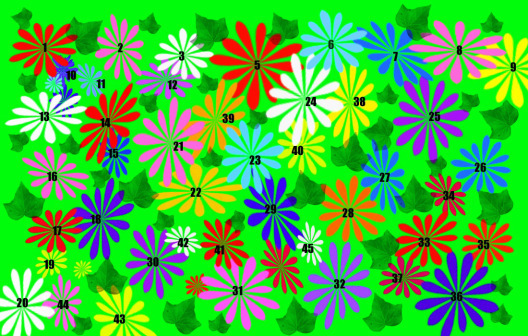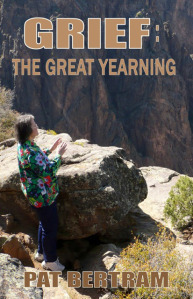Pat Bertram's Blog, page 235
May 8, 2013
How do you juggle the promotional aspects with the actual writing?
 I haven’t been juggling the promotional aspects with the actual writing. I’ve been concentrating mainly on promotion. I have a one-track mind, and for now I am focused on figuring out how to get my books to really take off. I don’t see why millions of people can’t enjoy my books (though so far, they don’t seem to agree). What writing I do falls under the category of promotion, such as blogging and keeping up with my chapters in Rubicon Ranch, the mystery serialization that several of us Second Wind authors are collaborating to write online. You can find the ongoing story here: Rubicon Ranch.
I haven’t been juggling the promotional aspects with the actual writing. I’ve been concentrating mainly on promotion. I have a one-track mind, and for now I am focused on figuring out how to get my books to really take off. I don’t see why millions of people can’t enjoy my books (though so far, they don’t seem to agree). What writing I do falls under the category of promotion, such as blogging and keeping up with my chapters in Rubicon Ranch, the mystery serialization that several of us Second Wind authors are collaborating to write online. You can find the ongoing story here: Rubicon Ranch.
Here are some responses from other authors about how they juggle promotion and writing. The comments are taken from interviews posted at Pat Bertram Introduces . . .
From an interview with P.I. Barrington, Author of Isadora DayStar
Promoting and writing? That’s the REAL trick of publishing today. Writing takes time, but for me at least, promotion is constant and at times overwhelming!
From an interview with Beth Groundwater, Author of “A Real Basket Case”
Promotion is something that is ongoing, and which ramps up around the time of each release (every spring and fall for the next two years, at least). I try to focus on the writing and editing I need to get done each week first, then work on promotion later in the day or later in the week after I’ve finished the writing I need to do to meet my deadlines. I have to be very organized and give myself weekly goals to stay on track..
From an interview with Dale Cozort, Author of “Exchange
I tend to do marketing in blocks of time rather than trying to do it at the same time as writing. I have writing days, editing days and marketing days. That fits my somewhat obsessive personality. I’m not sure if it’s the most effective way to get things done.
From an interview with Christine Lindsay, Author of Shadowed in Silk
The marketing and promotional aspects are awful. I love talking to people and making friends, but it’s not easy to always be talking about myself. The phrase “I must decrease in order for Him (the Lord) to increase” is running through my head quite a bit these days as I try to do my part in the marketing of my novel. It’s not just me that it affects, so I must do my part. But I hope I never sound pushy, but that I encourage someone in everything I say or write.
What about you? How do you juggle the promotional aspects with the actual writing?
(If you’d like me to interview you, please check out my author questionnaire http://patbertram.wordpress.com/author-questionnaire/ and follow the instruction.)
***
Pat Bertram is the author of the suspense novels Light Bringer, More Deaths Than One, A Spark of Heavenly Fire, and Daughter Am I. Bertram is also the author of Grief: The Great Yearning, “an exquisite book, wrenching to read, and at the same time full of profound truths.” Follow Pat on Google+. Like Pat on Facebook.
Tagged: a writer writes, advice to aspiring writers, aspiring author, author interviews, being a writer, writing for yourself


May 7, 2013
What advice you would give to an aspiring author?
 My advice to aspiring authors varies depending on how cynical I am about the book business on a given day.
My advice to aspiring authors varies depending on how cynical I am about the book business on a given day.
When I’m philosophical, I tell aspiring writers:
A book begins with a single word. Many novice writers get intimidated by the thought of writing an entire book, but all you ever need to write is one word. I know that’s not much of a goal, but in the end, it is the only goal. That’s how every book all through the ages got written — one word at a time. By stringing single words together, you get sentences, then paragraphs, pages, chapters, an entire book.
When I want to be encouraging, I tell aspiring writers:
Write your book. Rewrite it. Edit it Re edit it. Study the publishing business. Learn everything you can about good prose, story elements, promotion. With so many millions of people out there who have written a book or who want to write a book, the competition is fierce. A writer does not attain maturity as a writer until he or she has written 1,000,000 words. (I’m only halfway there.) So write. Your next book might be the one that captures people’s imaginations and catapults you into fame and fortune. Not writing another book guarantees you will never will reach that goal. It also keeps you from doing what you were meant to do.
When I’m cynical, I tell aspiring writers:
If you aspire to be a writer, write. That’s all it takes.
If you aspire to be a good writer, write — and read. Read how-to books about writing and read good books to absorb good writing.
If you aspire to be a bestselling writer, write, read — and gather luck. Less than 1% of 1% of writers ever attain that status.
Here are some responses from other authors about advice they give to aspiring writers. The comments are taken from interviews posted at Pat Bertram Introduces . . .
From an interview with Polly Iyer, Author of “Hooked”:
You’ve heard it before. Keep at it. Period.
From an interview with Sandy Nathan, Author of Tecolote: The Little Horse That Could
You’ll make more money as a brain surgeon.
From an interview with S. M. Senden, author of “Clara’s Wish”
Write from a place of knowing. Bring your experiences to what you write; be willing to invest a piece of yourself in your writing so it will be real to the reader.
From an interview with Tom Rizzo, Author of “Last Stand At Bitter Creek”
Read—not only for enjoyment. Treat your reading as a study lab, taking note of how the writer lures you into the story, how characters are introduced, and what makes you like or despise them. Reading soaks the brain with ideas and possibilities. And write, of course. Don’t wait for inspiration. Just write.
What about you? What advice would you give to aspiring writers?
(If you’d like me to interview you, please check out my author questionnaire http://patbertram.wordpress.com/author-questionnaire/ and follow the instruction.)
***
Pat Bertram is the author of the suspense novels Light Bringer, More Deaths Than One, A Spark of Heavenly Fire, and Daughter Am I. Bertram is also the author of Grief: The Great Yearning, “an exquisite book, wrenching to read, and at the same time full of profound truths.” Follow Pat on Google+. Like Pat on Facebook.
Tagged: a writer writes, advice to aspiring writers, aspiring author, author interviews, being a writer, writing for yourself


May 6, 2013
How Long Does it Take to Edit a Novel?
If you have an editor, the editor pretty much decides how long it takes to edit a novel, but if you’re self-editing, it takes as long as it takes for you to get it right, But more than that, it depends on what you’re editing for. Are you editing it for content, to make sure that every scene, every character, every bit of dialogue is the ablsolute best you can do? Are you editing for story flow? Or are you simply copyediting to remove typos? Each of my books took a year to write, then I set it aside for several months. When I went back to the book, I could read it as if I hadn’t written it and so could find many areas where the story bogged down. Then I re-edited it again in another few months, and then another few months later, and ended up spending as much time editing as writing. This was especially true of my first novel, More Deaths Than One because I had to learn to write as I went along. Each  editing session was more of a rewrite session — the published novel is completely different from the first draft, and yet it’s exactly what I was aiming for. In the end, it took about four years from first draft to finished manuscript. (In the interim periods, I wrote other books, so More Deaths Than One was the first novel I wrote, also the third, fifth, and seventh.)
editing session was more of a rewrite session — the published novel is completely different from the first draft, and yet it’s exactly what I was aiming for. In the end, it took about four years from first draft to finished manuscript. (In the interim periods, I wrote other books, so More Deaths Than One was the first novel I wrote, also the third, fifth, and seventh.)
I start out editing my books for content and flow, making sure that every scene, every character, every bit of dialog is the best I can do, and that every word, paragraph, chapter flows seamlessy one into the other without taking the reader out of the story, then I edit for individual words. Each of us has pet words and phrases, and the overuse of these constructions echo in readers ears, so I search for such duplication, and rewrite the appropriate passages. I also look for wishy-washy words and qualifiers that take the authority from my writing such as “I guess,” “a little,” “quite.” (In case you’re interested, here is the list of words I seek and destroy: Self-Editing — The List From Hell.) I do one final copy-editing session, then send the book to my editor, and finally my publisher.
The problem with most books on the market is that people rush to publish without giving themselves time to let the book rest before editing it with fresh eyes. Of course, this is a different market from the one I was writing for. Even as early as ten or twelve years ago, there were only a certain number of books on the market, and each had to be as good as possible to compete with the demands of the profession. Things have changed radically since then. With millions of people self-publishing, the key is quantity, not quality. Many authors publish three to four books a year just to keep their names fresh, and in such a disposable book world, editing is the first casualty.
I was appalled the first time I heard that someone had spent a week or so polishing the book they wrote during November’s National Novel Writing Month — how can anything written so fast have any depth? Such writers do find massive followings, though, so perhaps my way of “thinking” my books into reality (I spend way more time thinking about what to write than I do writing) is more out of step with today’s book world than those who simply dash off a book, do a slapdash job of editing, and then foist it on the reading public.
So, in the end, how long it takes to edit a novel depends on what you are looking for — quantity or quality. And before you start arguing that you can have both — the truth is you can’t have both unless you have a good editor on call who will do the editing for you. Writing is like driving. Everyone thinks they are a good driver, but all the bad drivers on the road show that a lot of those “good drivers” are mistaken.
***
Pat Bertram is the author of the suspense novels Light Bringer, More Deaths Than One, A Spark of Heavenly Fire, and Daughter Am I. Bertram is also the author of Grief: The Great Yearning, “an exquisite book, wrenching to read, and at the same time full of profound truths.” Connect with Pat on Google+
Tagged: editor, how long does it take to edit a novel, More Deaths Than One, National Novel Writing Month, self-editing, self-publishing


May 5, 2013
As Busy as a . . .?
Awww, you guessed!











***
Pat Bertram is the author of the suspense novels Light Bringer, More Deaths Than One, A Spark of Heavenly Fire, and Daughter Am I. Bertram is also the author of Grief: The Great Yearning, “an exquisite book, wrenching to read, and at the same time full of profound truths.” Follow Pat on Google+. Like Pat on Facebook.
Tagged: bee photos, bees, bees and flowers


May 4, 2013
Deep Thought. Or Not
When you’re looking at the world, don’t forget, the world is looking back at you.





***
Pat Bertram is the author of the suspense novels Light Bringer, More Deaths Than One, A Spark of Heavenly Fire, and Daughter Am I. Bertram is also the author of Grief: The Great Yearning, “an exquisite book, wrenching to read, and at the same time full of profound truths.” Follow Pat on Google+. Like Pat on Facebook.
Tagged: cows, goat, horse, photo essay, photos, praying mantis


May 3, 2013
Any Pinterest Users Out There?
Pinterest is supposed to be one of the hottest socialnetworking sites, but what exactly is the point? I know you use it like a bulletin board to pin photos and such that interest you, sort of lke a scrapbook, but then what?
And what if you don’t see things you like? That’s my problem — I don’t like “things.”
I get that it’s a fun site for most people, gives them something to play around with or dream about, but then what?
If you’re an author, how does that help you connect to readers? Or doesn’t it?
An author needs to be mindful of his or her “brand.” How does Pinterest help with branding?
Do you use Pinterst? What do you use it for? Do you find it fun, annoying, fascinating?
(This photo is from Second Wind Publishing’s Pins.)
***
Pat Bertram is the author of the suspense novels Light Bringer, More Deaths Than One, A Spark of Heavenly Fire, and Daughter Am I. Bertram is also the author of Grief: The Great Yearning, “an exquisite book, wrenching to read, and at the same time full of profound truths.” Connect with Pat on Google+. Like Pat on Facebook.
Tagged: pinterest, what do you do on pinterest, what is the point of pinterest


May 2, 2013
I Don’t Want Your Sympathy
If you think I write about grief to elicit sympathy or to look for a shoulder to lean on, well . . . you just don’t get it.
As I’ve said so often, I started writing about grief to make sense of my own feelings, and I kept doing so as a rebellion against a society that reveres happiness at all costs.
Although I am a private person, not given to airing my problems in public, I thought it wrong to continue the charade that life goes on as normal after losing the one person who makes life worth living. So, over the past three years, I have made it my mission to tell the truth about grief. Even though I have mostly reached the stage of peace, and life is opening up again, at least a  little bit, grief is still a part of my life. There is a void in my world — an absence — where he once was, and that void shadows me and probably always will. Although his death changed the circumstances of my life, thrusting me into an alien world, grief — living with it, dealing with it, accepting it — changed me . . . forever. It has made me who I am today and who I will become tomorrow — strong, confident, and able to handle anything that comes my way. (And maybe even a bit tough to deal with at times.)
little bit, grief is still a part of my life. There is a void in my world — an absence — where he once was, and that void shadows me and probably always will. Although his death changed the circumstances of my life, thrusting me into an alien world, grief — living with it, dealing with it, accepting it — changed me . . . forever. It has made me who I am today and who I will become tomorrow — strong, confident, and able to handle anything that comes my way. (And maybe even a bit tough to deal with at times.)
Would I prefer to have him in my life? Absolutely. But that is not an option. All I can do, all any of us can do, is deal with what lies before us, regardless of a society that frowns on mourning.
But I don’t need sympathy, I don’t need you to bleed for me, and I don’t need your shoulder to lean on. So what if I’m unhappy? Does that diminish your happiness? If it does, then that’s your problem, not mine. And you miss the point of these grief blogs — to survive a horrifyingly grievous loss by finding my footing in an unbalanced and alien world.
I do want something from you, though. If you are still coupled, I want you to smile at your loved one tonight instead of kicking him or her in the shin as you might prefer to do. I want you pause to hug him or her, and maybe give an extra kiss. This is an incredible gift I am giving you — a memory to cling to if ever you should become one of us bereft.
***
Pat Bertram is the author of the suspense novels Light Bringer, More Deaths Than One, A Spark of Heavenly Fire, and Daughter Am I. Bertram is also the author of Grief: The Great Yearning, “an exquisite book, wrenching to read, and at the same time full of profound truths.” Connect with Pat on Google+. Like Pat on Facebook.
Tagged: grief and loss, heart bleeds for you, sympathy, writing about grief


May 1, 2013
Pick a Flower and See What Ebook You Won!
Second Wind is celebrating May with a giveaway. Pick a flower and win a free ebook from Second Wind Publishing! Each number represents a Second Wind novel — even numbers for romance and chick lit; odd numbers for mystery, mainstream, and adventure. So, do you feel lucky? Go the the Second Wind blog (just click on the photo) and follow the directions. You won’t get a real flower, of course, since they are only virtual, but you will get a coupon for a free ebook in the format of your choice. (You need to post the number on the Second Wind blog, or else you won’t get your free ebook.)
Best of luck to you!
Offer ends May 15, 2013.
Tagged: ebook giveaway, free ebook, May giveaway, Second Wind Publishing


April 30, 2013
Grief Archives
I’ve had so many people stopping by to read one of my grief posts and then staying to read more, that I’m making it easy for everyone. I set up a separate page for all the articles I posted about grief. You can find them here: Archives — Grief Posts.
These are not the only writing about grief that I did. As you can see from the list, I hardly posted anything at all those first few months, but I still wrote. I was so lost, so lonely, so sick with grief and bewildered by all I was experiencing, that the only way I could try to make sense of it all was to put my feelings into words. Whether I was writing letters to Jeff (my deceased life mate/soul mate) or simply pouring out my feelings in a journal, it helped me feel close to him, as if, once again, I was talking things over with him. Those were such private moments, meant only for me (and him) that I never intended making any of it public, but when I found out how much it helps the bereft to hear about someone else’s grief and understand that their anguish is normal, I published them in my book Grief: The Great Yearning.
If you know someone who is grieving for a husband or a mother or a child, I hope you will consider gifting them with a copy, or at least sending them the link to my grief posts. Thank you.
***
Pat Bertram is the author of the suspense novels Light Bringer, More Deaths Than One, A Spark of Heavenly Fire, and Daughter Am I. Bertram is also the author of Grief: The Great Yearning, “an exquisite book, wrenching to read, and at the same time full of profound truths.” Connect with Pat on Google+. Like Pat on Facebook.
Tagged: Grief archives, grief blog, Grief: The Great Yearning


April 29, 2013
My Aching Breaking Heart
My heart is breaking. I thought when my life mate/soul mate died that the organ had shattered beyond repair, but it must have healed because I feel as if it is breaking again.
When I first entered the world of grief, I was stunned by the constant assault of emotions, physical reactions, mental conflicts and torments because I’d never heard of such grief. Well, there was that one old woman who wore black the whole of her life, celebrating her widowhood, and occasionally there would be talk of someone keening in agony at her husband’s funeral. I thought those were isolated cases of unbalanced women, but I am not unbalanced. (And probably they weren’t, either.)
I wrote about what I was going through so I could try to make sense of the onslaught, and it helped. Blogging about grief also helped because I met many others on the same journey, which brought me comfort, and a few who were years ahead of me, which brought me hope.
Somewhere in the back of my mind, I thought this fathomless grief set me aside from everyone else, and perhaps I even thought I should have special consideration because of my situation. Then others I knew lost someone they loved, and I realized grief didn’t make me special. It just made me . . . bereft.
After three years, I am still sad. I tend to think I’m not making any progress, but then I hear from women who just lost their husbands, and I am drenched in tears, remembering what it was like when grief was new. And I can see how very far I have come.  But I also know what these women are feeling and how much they will have to deal with in the coming months and years, and my heart breaks for them.
But I also know what these women are feeling and how much they will have to deal with in the coming months and years, and my heart breaks for them.
How is it possible that so many of us have lost our mates and soul mates? It’s like a bizarre dance of butterflies, where those we love flit into our lives, bringing wonder and color and joy, and then they flit away, leaving us devastated. How can the world survive when it is so awash in grief? (Perhaps that’s where the oceans came from — the tears of the bereft. After all, throughout the ages, billions of people have mourned for their dead.)
Sometimes I see a photo of or an article about a couple who has been married for forty or fifty years. They always have helpful advice about how they stayed together for so long, but the truth is, despite all their ways of keeping love alive, the reason they were together so long is that one of them didn’t die. Not every loving couple gets that opportunity.
And my heart breaks for the one left behind.
***
Pat Bertram is the author of the suspense novels Light Bringer, More Deaths Than One, A Spark of Heavenly Fire, and Daughter Am I. Bertram is also the author of Grief: The Great Yearning, “an exquisite book, wrenching to read, and at the same time full of profound truths.” Connect with Pat on Google+. Like Pat on Facebook.
Tagged: blogging about grief, grief and loss, grief at three years, loss of a soul mate, new grief, world of grief








